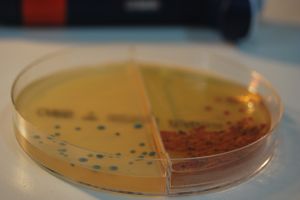San Millán destaca que “en estudios previos se ha demostrado que las bacterias portadoras de plásmidos de resistencia son capaces de formar reservorios en los ambientes hospitalarios y transmitirse a la microbiota intestinal de pacientes hospitalizados. La novedad de este estudio es que demuestra que “una vez estas bacterias portadoras del plásmido de resistencia colonizan el intestino de un paciente, este plásmido se transfiere con alta frecuencia a otras bacterias residentes en la microbiota intestinal de este paciente y produciéndose una colonización a largo plazo”. Aunque la bacteria productora de la colonización inicial desaparezca, las bacterias que han adquirido este plásmido pueden permanecer en la microbiota durante meses o incluso años.
Ricardo León-Sampedro, investigador del IRYCIS y el Hospital Ramón y Cajal recalca “los riesgos de esta colonización de larga duración, tanto a nivel individual, ya que puede producir el fracaso de tratamientos antibióticos en el paciente, como general, ya que promueve el mantenimiento y potencial diseminación del mecanismo de resistencia hacia otros pacientes o miembros de la comunidad.” Javier de la Fuente, otro de los investigadores responsables del trabajo cree que “nuestro estudio apunta a la necesidad del desarrollo de nuevas terapias capaces de impedir la diseminación horizontal de plásmidos de resistencia a antibióticos y de descontaminar selectivamente la microbiota intestinal de los pacientes de cepas portadoras de estos plásmidos de gran relevancia clínica”.
Más información
Pervasive transmission of a carbapenem resistance plasmid in the gut microbe of hospitalized patients. León-Sampedro R, de la Fuente J, Díaz-Agero C, Crellen T, Musicha P, Rodríguez-Beltrán J, de la Vega C, Hernandez-García M, r-GNOSIS WP5 study group, López-Fresneña N, Ruiz-Garbajossa P, Cantón R, Coper BS, San Millan A. Nature Microbiology 2021 DOI: 10.1038/s41564-021-00879-y






